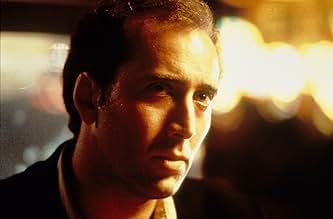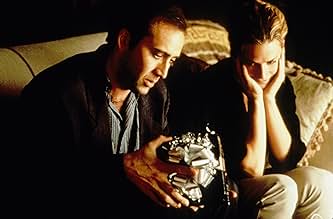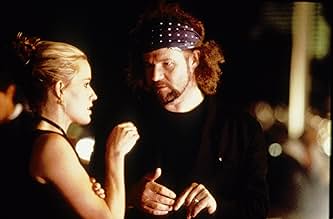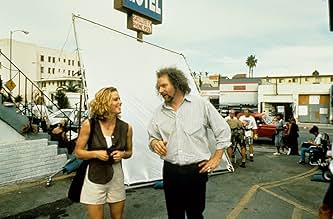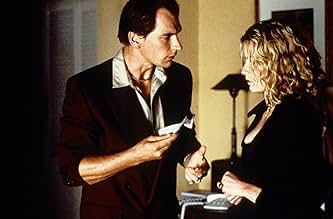Ben Sanderson, uno sceneggiatore di Hollywood che ha perso tutto a causa del suo alcolismo, arriva a Las Vegas per bere fino alla morte. Incontra e fa amicizia con la prostituta Sera.Ben Sanderson, uno sceneggiatore di Hollywood che ha perso tutto a causa del suo alcolismo, arriva a Las Vegas per bere fino alla morte. Incontra e fa amicizia con la prostituta Sera.Ben Sanderson, uno sceneggiatore di Hollywood che ha perso tutto a causa del suo alcolismo, arriva a Las Vegas per bere fino alla morte. Incontra e fa amicizia con la prostituta Sera.
- Vincitore di 1 Oscar
- 32 vittorie e 30 candidature totali
Albert Henderson
- Man at Strip Bar
- (as Al Henderson)
Recensioni in evidenza
Remarkable. Touching. Riveting. Leaving Las Vegas is all of these and then some. I have not seen a film of this magnitude about loneliness and acceptance in such a while that I was in tears for much of the run time.
Nicholas Cage is Ben, a man who has lost his wife and child, throws his job away, and takes all of his remaining money to buy as much liquor as possible and "drink himself to death" in the city of Las Vegas. He has given up all hope, with no wish to live, but for one reason or another, wants a companion to share in his misery, but not try to save him. He finds this companion in a hooker, Sera, played by Elizabeth Shue. They immediately form a strong relationship based on one night of talking about their lives. Sera in particular quickly grows attached to Ben, for no other reason than she has been alone her whole life and wants nothing more than to feel that want and need by someone.
Cage won his first Oscar for his role as Ben, and how deserved it was. He was astounding, perfection, down to every single tick, the volume of his voice, the pain and tragedy buried in his eyes. I could not believe the extent of his role, the dedication and time he invested in bringing this character to life. Same goes for Elizabeth Shue, who with a simple glance at a person, she reveals her entire self, and no one even dares to notice except for Ben. This neediness is apparent, she wants to hold onto this relationship so badly, yet what makes their relationship work is total and complete acceptance of their respective decisions. He will not tell her to stop being a hooker, and she in return can never ask him to stop drinking. And it is in that factor that makes this film worth watching. To be totally accepted by those around them, to open themselves up to such an extreme.
Leaving Las Vegas is a sobering film about connections, loneliness, acceptance, and a small little island of hope that is Ben and Sera. They are two good people, depicted in a world full of sorrows and misdeeds, who latch onto each other and never let go. They were nothing but ghosts, till that chance encounter, and became each others worlds. Cage and Shue bring these good people to life in such an extraordinary way, making Leaving Las Vegas a film to be treasured and remembered for years to come. I highly recommend this film.
Nicholas Cage is Ben, a man who has lost his wife and child, throws his job away, and takes all of his remaining money to buy as much liquor as possible and "drink himself to death" in the city of Las Vegas. He has given up all hope, with no wish to live, but for one reason or another, wants a companion to share in his misery, but not try to save him. He finds this companion in a hooker, Sera, played by Elizabeth Shue. They immediately form a strong relationship based on one night of talking about their lives. Sera in particular quickly grows attached to Ben, for no other reason than she has been alone her whole life and wants nothing more than to feel that want and need by someone.
Cage won his first Oscar for his role as Ben, and how deserved it was. He was astounding, perfection, down to every single tick, the volume of his voice, the pain and tragedy buried in his eyes. I could not believe the extent of his role, the dedication and time he invested in bringing this character to life. Same goes for Elizabeth Shue, who with a simple glance at a person, she reveals her entire self, and no one even dares to notice except for Ben. This neediness is apparent, she wants to hold onto this relationship so badly, yet what makes their relationship work is total and complete acceptance of their respective decisions. He will not tell her to stop being a hooker, and she in return can never ask him to stop drinking. And it is in that factor that makes this film worth watching. To be totally accepted by those around them, to open themselves up to such an extreme.
Leaving Las Vegas is a sobering film about connections, loneliness, acceptance, and a small little island of hope that is Ben and Sera. They are two good people, depicted in a world full of sorrows and misdeeds, who latch onto each other and never let go. They were nothing but ghosts, till that chance encounter, and became each others worlds. Cage and Shue bring these good people to life in such an extraordinary way, making Leaving Las Vegas a film to be treasured and remembered for years to come. I highly recommend this film.
"Leaving Las Vegas" is an insightful, harrowing experience about the binding forces of true romance, the power of encouragement and compassion, and the tragic effects of alcoholism. The performances are absolutely astounding: Nicholas Cage delivers one of the most unforgettable, genuine, and human performances ever captured on film (a well-deserved Oscar for every reason), and Elisabeth Shue, as his soul provider and protector through the trauma of his alcoholic turmoil is sentimental, passionate, and definitely deserving of the Oscar for Best Actress in 1995, providing us with the eye of Ben Sanderson's heart and soul, as his equally troubled lover who has pledged to stay with him through tears and trials. Director Mike Figgis is intensely effective in following the many turmoils of Sanderson as he copes with terminal alcoholism, even going so far as to declaring he will "drink himself to death in Las Vegas", and the effects of his struggle upon his functions, health, and spirit, as well as the corresponding attributes of his loyal lover, Sara. I'm certain that anyone who has experienced the turmoil of alcoholism or has been deeply involved with such an abuser will gravely appreciate the realism and depth of this film to address the egregious effects of drinking constantly, and how this alcoholism tears many lives literally apart. I was horrified by Sanderson's dependence upon alcoholism as a substitute for happiness and control, and Nicholas Cage's uncanny human performance, with all of his appropriate, convincing twitches and erratic movements, enhanced the compassion and torment I felt for this character, who has literally surrendered his life to this terrible disease of alcoholism. We gasp in horror as we see Sanderson taking a shower with a bottle of gin in hand, and trembling to the refrigerator for a bottle of vodka: these are the true, tragic symptoms of alcoholism, and this film does an excellent job in addressing them. A brilliant, tragic, yet extremely essential study of the disease of alcoholism and how it can destroy every aspiration, every desire, and every state of consciousness we have within ourselves, when we are constantly craving "one more bottle of vodka" 24 hours a day, 7 days a week... Nicholas Cage delivers one of the most heartfelt and eerily convincing performances in the history of film, and this is one lamentable, subliminal look at one of the saddest and unnecessary addictions in humans: striving to either enhance, better, or in this case, destroy their lives in constantly drinking intoxicating and deadly substances. Sanderson to Sara: "You can never make me stop drinking"--- the sad, yet frighteningly real state of mind of a disparaged, hopeless, alcoholic. **** out of ****
Nic Cage is hit and miss with me. This is him at his best. His pain, apathy, hopelessness, helplessness, pathetic-ness (if that's a word) is heart wrenching. You can't help but pity him but at the same time you know he's on the correct path -- for him. It's sad. But beautiful at the same time because of his relationship with her. The thing that makes this performance so amazing to me is that he's usually such a loud, boisterous character, sometimes to the point of obnoxiousness but here he is so understated. If it's not the best performance of all time, it is definitely his best performance. For me.
Not unlike John Huston's Under The Volcano, Leaving Las Vegas borrows from Greek mythology, obliquely mirroring the tragedy and pathos of Orpheus' failed attempt to rescue his dead wife, Eurydice, from Hades. Mike Figgis obliges us with a helpful hint in the scene where Nicolas Cage gives Elizabeth Shue a present of earrings: Greek cameos.
As in the ancient tale, love challenges the inevitability of death, although, in the case of LLV, roles are upended and sometimes blurred, and Orphean references are either thinly disguised, or non-specific to the point of being thoroughly sublimated. Academic, to be sure, but completely acceptable as long as LLV can sustain itself and remain engaging. And it surely does, thanks to Figgis' intelligent script and direction, Cage's role as a down-and-out writer and his protracted self-destruction, and Shue's portrayal of a lonely hooker, lifting that old bromide beyond what could have been routine, to a level not seen since Jane Fonda's character in Klute. Excellent performances all around.
With all that said, this film is not for everyone (in particular those who only respond to gratuitous sex, car chases, and mindless pyrotechnics). The lurid depictions of despair, self-loathing, and violence could put off even the most hardened social worker. In my mind's eye, I could see psychiatrists amongst the theater audiences, furiously jotting down their observations. Understandable; the two principal characters are, in the common parlance, screwed up. One cannot cope with failure, so decides to opt out, while the other does cope, but only barely, existing along the ragged edges of what passes for society in Nevada Hell. These details, though, tend to outline and, indeed, strengthen the true heart of this film: Sacrifice and Unconditional Love.
If this film is not for everyone, then who is it for? Those with real life experience and the maturity gained thereby. Those with strong emotional constitutions. Anyone appreciative of impassioned performances. Freudians. Alcoholics, recovering and otherwise. Pimps. Priests. Classicists. Petty whiners in need of perspective. And, more than anyone else, couples who plan on breaking up. In sickness and in health, 'til death do us part. 9.5 out of 10.
As in the ancient tale, love challenges the inevitability of death, although, in the case of LLV, roles are upended and sometimes blurred, and Orphean references are either thinly disguised, or non-specific to the point of being thoroughly sublimated. Academic, to be sure, but completely acceptable as long as LLV can sustain itself and remain engaging. And it surely does, thanks to Figgis' intelligent script and direction, Cage's role as a down-and-out writer and his protracted self-destruction, and Shue's portrayal of a lonely hooker, lifting that old bromide beyond what could have been routine, to a level not seen since Jane Fonda's character in Klute. Excellent performances all around.
With all that said, this film is not for everyone (in particular those who only respond to gratuitous sex, car chases, and mindless pyrotechnics). The lurid depictions of despair, self-loathing, and violence could put off even the most hardened social worker. In my mind's eye, I could see psychiatrists amongst the theater audiences, furiously jotting down their observations. Understandable; the two principal characters are, in the common parlance, screwed up. One cannot cope with failure, so decides to opt out, while the other does cope, but only barely, existing along the ragged edges of what passes for society in Nevada Hell. These details, though, tend to outline and, indeed, strengthen the true heart of this film: Sacrifice and Unconditional Love.
If this film is not for everyone, then who is it for? Those with real life experience and the maturity gained thereby. Those with strong emotional constitutions. Anyone appreciative of impassioned performances. Freudians. Alcoholics, recovering and otherwise. Pimps. Priests. Classicists. Petty whiners in need of perspective. And, more than anyone else, couples who plan on breaking up. In sickness and in health, 'til death do us part. 9.5 out of 10.
Leaving Las Vegas is a very powerful character drama that happens to be the best acting Nicholas Cage has ever done. We are so used to his over-the-top performances, but this role is very reserved. He does play an alcohol addict, but he isn't crazy for the majority of the film and that's a relief. This film was made on a very cheap budget, but that doesn't matter when we get too involved in the story and the relationship between the two main characters.
Mike Figgis's film is about a Hollywood screenwriter named Ben who loses everything thanks to his alcoholism. He decides to go to Las Vegas to literally drink himself to death and that's where he meets a prostitute, Sera. They form a relationship despite their issues and each realize they form a special bond with each other.
The acting is very good. Nic Cage does a career role and his portrayal of an alcoholic is very realistic and disturbing. I'm perturbed on how much alcohol he drank in the film. Elizabeth Shue does very well as Sera and we are able to feel her pain despite her profession.
Overall, this is a very surreal and realistic drama that focuses mightily on characterization. I don't like what each person does, but somehow the movie makes me feel bad for them and root for good things to happen to our main characters. Also, I really liked the look and the feel of the film. It gives out a more realistic feeling. Thanks to the raw, gritty, and powerful performances, this movie works on a high level. I rate this film 9/10.
Mike Figgis's film is about a Hollywood screenwriter named Ben who loses everything thanks to his alcoholism. He decides to go to Las Vegas to literally drink himself to death and that's where he meets a prostitute, Sera. They form a relationship despite their issues and each realize they form a special bond with each other.
The acting is very good. Nic Cage does a career role and his portrayal of an alcoholic is very realistic and disturbing. I'm perturbed on how much alcohol he drank in the film. Elizabeth Shue does very well as Sera and we are able to feel her pain despite her profession.
Overall, this is a very surreal and realistic drama that focuses mightily on characterization. I don't like what each person does, but somehow the movie makes me feel bad for them and root for good things to happen to our main characters. Also, I really liked the look and the feel of the film. It gives out a more realistic feeling. Thanks to the raw, gritty, and powerful performances, this movie works on a high level. I rate this film 9/10.
Lo sapevi?
- QuizAuthor John O'Brien, on whose novel this movie is based, committed suicide two weeks after the movie went into production. Director Mike Figgis contemplated abandoning the project, but decided the film would make a good memorial for O'Brien.
- BlooperYuri is supposed to be swearing in Latvian on the phone. In fact, he speaks gibberish.
- Citazioni
Ben Sanderson: I don't know if I started drinking 'cause my wife left me or my wife left me 'cause I started drinking, but fuck it anyway.
- Curiosità sui creditiThe opening credits do not appear until fifteen minutes into the film.
- Versioni alternativeLaserDisc version is unrated and contains more sexually explicit footage. First pressings of the VHS versions also contained this footage but later pressings did not. The Unrated Edition has also been released on DVD and Blu-ray and runs 112 min.
I più visti
Accedi per valutare e creare un elenco di titoli salvati per ottenere consigli personalizzati
Dettagli
- Data di uscita
- Paese di origine
- Sito ufficiale
- Lingue
- Celebre anche come
- Adiós a Las Vegas
- Luoghi delle riprese
- River Palms Resort Casino - 2700 South Casino Drive, Laughlin, Nevada, Stati Uniti(interiors, as Gold River Casino and Resort)
- Aziende produttrici
- Vedi altri crediti dell’azienda su IMDbPro
Botteghino
- Budget
- 3.600.000 USD (previsto)
- Lordo Stati Uniti e Canada
- 32.029.928 USD
- Fine settimana di apertura Stati Uniti e Canada
- 70.864 USD
- 29 ott 1995
- Lordo in tutto il mondo
- 32.029.928 USD
- Tempo di esecuzione1 ora 51 minuti
- Colore
- Mix di suoni
- Proporzioni
- 1.66 : 1
Contribuisci a questa pagina
Suggerisci una modifica o aggiungi i contenuti mancanti

Divario superiore
What was the official certification given to Via da Las Vegas (1995) in Japan?
Rispondi

